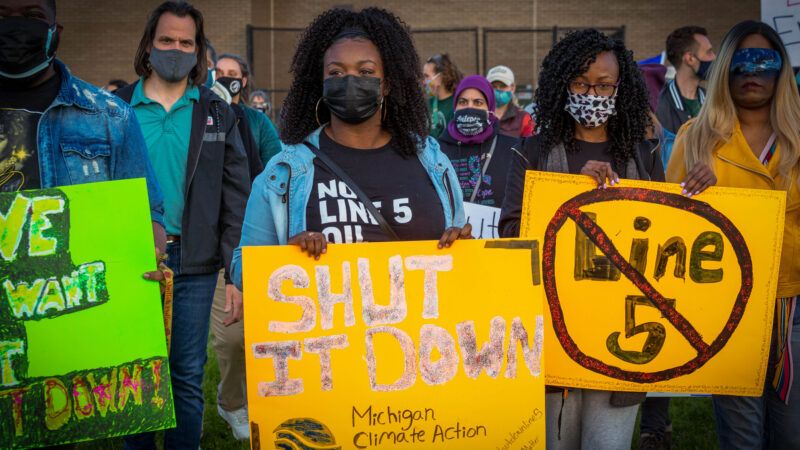Restricting Reliable Energy Sources Is Expensive and Dangerous
Pipelines work, while solar and wind energy often leave people in the dark.

Government officials fail to serve citizens when their policies deliberately limit access to affordable, reliable energy sources like gasoline, natural gas, nuclear, or propane. Michigan Gov. Gretchen Whitmer's campaign to close the Line 5 pipeline is one of the more pressing examples of this failure.
Unfortunately, this reality is hindering a growing number of American lives, as no reasonable alternatives exist for transportation fuels like gasoline or jet fuel, or for heating and cooking fuels like propane for rural households. The Line 5 pipeline, which crosses through the Great Lakes at the Straits of Mackinac between Michigan's upper and lower peninsulas, supplies 55 percent of the statewide demand for propane. It also supplies jet fuels for the Detroit Metropolitan Wayne County Airport and several other airports throughout the region and crude oil that is refined into gasoline and other fuels at refineries in Michigan, Ohio, Ontario, and Quebec.
While "shut it down" advocates often claim Line 5 is a Canadian pipeline that doesn't benefit the United States, a recent report by the Consumer Energy Alliance estimated that, if enforced, Whitmer's closure mandate will cost Michigan, Ohio, Indiana, and Pennsylvania $20.8 billion in economic activity, $2.4 billion in salaries and wages, and almost 34,000 jobs. Many American and Canadian government officials (from both sides of the political aisle), business interests, and labor union representatives have come out in favor of keeping the pipeline operating. They have also described their support for protecting the Great Lakes and retaining energy infrastructure by removing the pipeline from the water and moving it 100 feet below the lakebed to a cement-lined tunnel.
But with her attempts to shutter energy infrastructure and her executive actions requiring Michigan to go carbon neutral by 2050, Whitmer appears to have fallen for two myths. First, the notion that human use of reliable energy is necessarily destructive and must be stopped. Second, the idea that diffuse, unreliable, overly expensive, and often not-yet-even-available energy sources can somehow replace traditional energy sources.
Others have made the same error.
Texas has spent tens of billions over the past decade shutting down reliable energy and trying to replace it with "reliably unreliable" wind. Generous federal subsidies and a laser focus on the lowest prices, rather than valuing a reliable service, skewed electricity markets and ensured new wind was prioritized over constructing and maintaining reliable, properly weatherized power generation equipment. The consequences of this were seen in February when an unusual, but not unprecedented, bout of extreme cold led to a systemwide failure of Texas' increasingly fragile grid, leaving millions of Texans in the cold and dark.
In California, green priorities have led the state to build solar panels rather than complete essential maintenance on transmission lines. Strong winds during the 2019 summer heat wave caused aging transmission infrastructure to fail, sparking massive wildfires. Similarly, California's 100 percent clean energy target was at the root of the summer 2020 rolling blackouts when increased energy use during a heat wave ran headlong into what an official report called solar's inability to "meet demand in the early evening hours."
The California Public Utilities Commission's nonsensical commitment to closing the state's primary sources of reliable, emissions-free electricity (the San Onofre and Diablo Canyon nuclear plants) has only added to their problem. And Gov. Gavin Newsom's ban on the sale of new gasoline-powered vehicles by 2035 will force the state's already struggling grid to take on the stress of charging millions of electric vehicles each night.
In Washington state, green politicians and activists routinely advocate for breaching large hydroelectric dams, claiming (wrongly, it would seem) that doing so is essential to maintaining salmon populations. But relying on non-hydro renewables would leave citizens exposed to situations like November 2019, when the state's wind resources went to essentially zero for an entire week.
At the federal level, President Joe Biden has reentered the Paris climate agreement and canceled the construction permit for the Keystone XL pipeline. Strangely, however, he appeared willing to overlook climate concerns when he bucked bipartisan congressional opposition and waived sanctions against the Russian Nord Stream 2 gas pipeline, which he had previously called a "bad deal for Europe."
Yet while the president bans American energy and gives his tacit blessing to Russian energy production, numbers from the Energy Information Administration, published in late March, indicate that U.S. gasoline prices had increased for 17 consecutive weeks. Crude oil prices have risen from $43 per barrel in November last year to $67 in March this year, roughly a 2.4-cent-per-gallon increase.
On the heels of those price increases, an attack committed by a Russian cybercrime gang forced the closure of the Colonial Pipeline, one of the nation's largest pipelines and the source of much of the gasoline used on the East Coast. Media reports indicated that fuel shortages and panicked buying drove average national gas prices to a seven-year high.
Despite the increasing prices, rolling blackouts, fuel shortages, and the repeated failure of renewable energy sources just when they are most needed, Michigan's governor and many other government officials cling to their anti-reliable-energy policies and their nationwide campaigns to shutter or stop pipelines. Pursuing policies that impose "reliably unreliable" energy on citizens and ratepayers is a dangerous recipe for failure.


Show Comments (120)